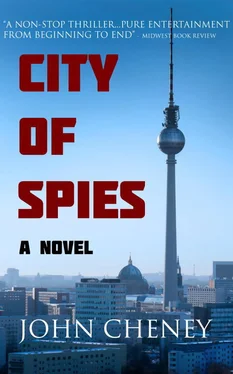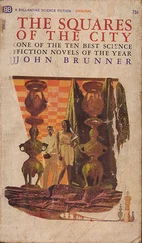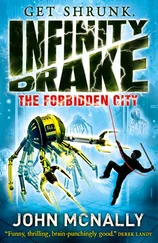“It is. That’s why I brought it to you. You’re the man who will have to act. You have the plans. Prepare them. I’ve sent copies of these messages on, but I assure you, Comrade General Dietrich, there will be no other option than an invasion. Now the West has forced our hand. We have to stop them before they get to us first. We joined together because we’re men of initiative. When our country needs us to act, we do so. And the moment to act is now.”
Dietrich grew irritated. “What is wrong with you, Scharf? I told you this is probably disinformation, and now you want to rush ahead with STOSS . Frankly, I’m rethinking the entire operation.”
“What do you mean?” Scharf asked, alarmed.
Dietrich sighed. “Maybe the invasion isn’t such a good idea after all.”
Scharf turned his back to Dietrich, seemingly deflated. He paused a moment, then with his back still turned, looked up. He watched a black crow streak through the clear blue sky, cawing as it flew. When Scharf spoke again, it was quietly.
“Then you won’t help me?” He waited for what seemed a long pause.
“No,” Dietrich growled. “You’re on your own, if you want to start a war.”
“Pity,” Scharf said, turning.
He swiftly pulled a Walther PPK from his jacket and fired into Dietrich’s chest. Shocked, Dietrich stumbled backward and fell to the ground. Suddenly the chilly frost against his back was met with a warm wetness. Dietrich coughed, his lungs filling with blood as he writhed on the ground. He looked up to see Scharf standing above him. Scharf coldly aimed the pistol again. There was an expression on his face that frightened Dietrich.
“Then I no longer have use for you,” Scharf said.
A second gunshot rang out in the cold morning air.
Scharf pulled the magazine out of the gun with his gloved hands. Then he flung both the pistol and the clip into the reeds. Quickly he pulled a half-burned cigarette out of his pocket, a Gauloise, and dropped the stub into the grass at his feet. He made a quick survey of the area, then hurried back to his car, watching to ensure he left no footprints along the trail. Within moments, Scharf was on the road.
It was late afternoon, two days later, when Dietrich’s body was found. A man walking his dog came across the body on the trail. He immediately called the People’s Police. Within in a matter of minutes, the Stasi and a contingent of military police also arrived on the scene. Altogether over twenty officers and the coroner were gathered with their vehicles on the road along the meadow. The scene quickly became a jurisdictional mess. Policemen scoured the scene and found the cigarette stub quickly. The pistol was harder to find, but after sweeping through the tall brush inch by inch, they found it and the magazine clip too.
Scharf arrived at the scene just as the gun was being bagged for evidence. A Stasi officer named Fehlborn had taken charge of the investigation. Scharf approached him immediately.
“Who found the body?” Scharf asked.
“A local who was taking a stroll,” Fehlborn replied, pointing toward a white-haired old man who was seated in the back of a police car. The door was open and a whole gaggle of police had surrounded it, asking the man questions. “Would you like to question him?”
Scharf looked toward the crowd and waved his hand, declining. A police technician handed Fehlborn the bagged gun.
“You should see this, Comrade Colonel,” Fehlborn said, his voice low.
“Western-manufacture.” Scharf examined the gun. “Hmm. Walther PPK. Get it to the lab immediately for analysis.”
Dietrich’s death sent shock waves through the GDR’s defense ranks. The next morning, an emergency meeting of the Defense Council was held. Hans was present, as were Müller and Scharf. The Minister of Defense led off, recounting the discovery of Dietrich’s body in the field. He explained that analysis of the gun revealed no fingerprints or serial number.
“So where do we stand?” Müller inquired.
Fehlborn, who brought the test results directly to the meeting, answered. “The gun itself suggests a security breach. A western-manufactured weapon used to commit murder here in the GDR. This is the work of the Dark Forces.” The Dark Forces was the Soviets’ favorite term for the CIA. Communist propaganda always preached of the danger of ‘imperialist conspiracy’; accordingly, the Dark Forces had to be at the heart of any mischief in the East. Fehlborn’s investigative mind, however, prompted him to add a qualifier. “They, at the very least, are accomplices.” This news troubled the council.
“That’s not all,” Scharf continued, adopting sober tone of warning. “We intercepted a message three days ago from somewhere within our part of the city. If the coroner’s time of death is accurate, it came only four hours after Dietrich was murdered. It referred directly to his death as an assassination.”
The generals were floored.
“This message was also confirmed by Comrade Major Wendt’s listening post. The facts do not lie, comrades. General Dietrich was murdered with a gun manufactured in the West. He was shot at close range.” Scharf let the words hang. Around the room, the faces of each of the ministers darkened. None of them wanted to contemplate the obvious. “He knew his murderer. And this person confirmed Comrade Dietrich’s death via secret radio message to his fellow conspirators in the West. Comrades, we have a mole within our ranks.”
An explosion of chatter filled the room, ranging from outrage to mutterings of shock and fear. Hans sat perfectly still, though his stomach dropped.
Scharf concluded, “This is a matter of utmost national security. The Minister of State Security has appointed me to head the search for this man.”
After the meeting adjourned, Hans followed Müller over to his office. Both men felt uneasy about Scharf’s new investigation.
“This is not the usual way to seek out a mole,” Hans said.
“No. Discretion is usually required in these matters. Otherwise, it spreads fear like a pathogen.”
“Scharf wants to spread fear.”
“Yes,” Müller concurred. “He’ll use it to scatter his opposition, just like Fass. The wolf drives the herd to flee, then singles out his prey.” Müller paused for a moment, then looked at Hans. “Tell me, Comrade Brandt, are you a wolf?”
“No.”
“What are you then?”
Hans thought for a moment, then nodded. “I’m a shepherd.”
“Hmm,” Scharf grimaced. “But the shepherd must think like a wolf to protect the flock.”
That evening, Hans returned to his secret apartment on Lehmbruckstrasse. Alone, in the light of a desk lamp, he laid out his covert equipment. He began to retool his weapons and surveillance devices. Hans wanted his tools to be easily at hand, available whenever needed. Taking the belt from his uniform, he fashioned a concealed, spring-loaded gun in the buckle. Hans remembered from his CIA training that the Nazi SS created a similar device during World War II. Unlike the Nazi device, which could house four separate firing chambers, Hans’ belt buckle gun could only fire twice. Still, Hans knew the importance of this weapon. He would not be prey.
Hans had a restless sleep that night. He woke before dawn, packed a small suitcase, and drove three hours north to Stralsund, a city on the Baltic coast. As Hans approached the city, he caught sight of the dramatic spires of Stralsund’s three Brick Gothic churches. The towering medieval structures were built when Stralsund was a member of the wealthy Hanseatic League of merchants. Hans drove through the cobblestone streets of the old city and across the Rügendamm bridge to the small island of Dänholm. The island lay between Stralsund and the much larger island of Rügen. Dänholm had housed a naval garrison since the Prussian empire, and in the 1950s, the GDR established its naval college on the base. Hans reported to the small port where a Coastal Border Brigade patrol boat was docked. He boarded the vessel and was greeted by Lieutenant Strelitz, the officer in charge of that section of coastline. The cruiser motored out of Dänholm into the Strela Sound.
Читать дальше












